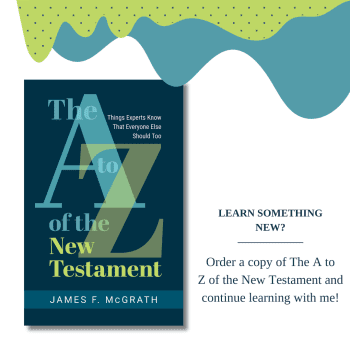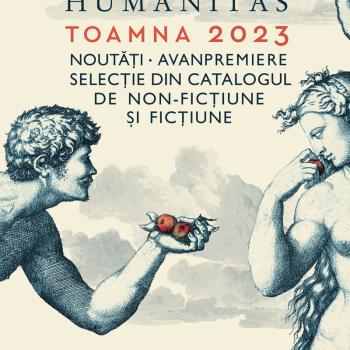There is a letter to the editor in the Summer 2021 issue of Biblical Archaeology Review about my article there (“The Writing on the Floor”) based on my chapter in What Jesus Learned from Women about the woman accused of adultery:
The Trial of Bitter Waters
I GREATLY APPRECIATED James McGrath’s article “The Writing on the Floor” (Spring 2021),
which did so much to explain the story in John 8:2–11. The author describes the woman in this story as a young, betrothed virgin who was found to be pregnant, and her fiancé did not accept the child as his. In such cases, McGrath points out, the woman could be subjected to the sotah, or the trial of bitter waters (Numbers 5:11–31). McGrath also points out that Jesus was criticizing the Temple authorities for the cessation of this ritual practice, because it let the guilty get off unpunished.
Jesus may have had an additional reason for being critical of the abolishment of this legal option. His mother, Mary, may have been subject to the trial of bitter waters. In the late second-century C.E. apocryphal text The Protoevangelium of James, in section 16, the high priest gives both Joseph and Mary “the water of conviction” or “the water of refutation,” and sends each of them into the wilderness, and each of them returns whole. This clearly is a reference to the water of bitterness in Numbers 5:16–18, 23–24. In the Protoevangelium, after Mary and Joseph return unharmed, the high priest says: “If the Lord God has not made manifest your sins, neither do I condemn you.” This is just what Jesus says to the woman in John 8:11. Possibly the author of the Protoevangelium knew the story in John 8 and was quoting from it (he incorporates other New Testament passages elsewhere in his work), but he is in error on the Jewish law (as he is elsewhere in his work), because in Numbers 5:11–31 the bitter waters are only given to the woman, not the man. In the Protoevangelium and in John 8, both the man and the woman are held equally responsible for their actions.
Barbara Sivertsen
Oak Park, Illinois
There is also a question that was asked about the story in John 8, and why I would focus so much attention on a story added to the Gospel of John only centuries after its original composition. Here is my reply to that question:
The question of “authenticity” focuses on only one of several relevant matters, namely whether the story was an original part of the Gospel of John. The consensus is that it was not, and I do not suggest otherwise. However, Eusebius informs us that some form of the story was known to Papias and was also to be found in the Gospel of the Hebrews, and so the story was circulating very early. The eventual inclusion of the story in the Gospel of John probably reflects the conviction that this story that was widely known belongs in the New Testament. My approach reflects all these considerations, a recognition that just as not everything in the canon is historical, not everything outside it is ahistorical.
Of related interest:
Dorothy Lee on whether Jesus was a feminist
Sara Parks’ article “Women and Gender in the Apocrypha” (her contribution to The Oxford Handbook of the Apocrypha) may be read online for a limited time.
Pete Enns talks to Kristin Du Mez on his podcast
Mike Bird on a recent statement regarding complementarianism
Is Having Women in Ministry Really a Recent Invention?
Women in Ancient Israel and the Hebrew Bible
Ancient Housewives, Weavers, and Businesswomen
Russell Moore’s Departure from the Southern Baptist Convention
How Medicine Has Failed Women Over Time
The 2021 SBC and the Cost of (Not) Writing The Making of Biblical Womanhood
https://friendlyatheist.patheos.com/2021/06/06/christian-mommy-blogger-claims-fighting-for-social-justice-causes-depression/
https://friendlyatheist.patheos.com/2021/06/10/christian-mommy-blogger-the-goal-of-feminists-is-destroying-monogamy-2/
There was an article in New Humanist about religious marriage ceremonies. See also this video on “biblical womanhood” featuring Dr. Moyra Dale.













